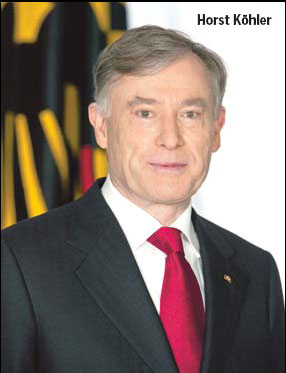Federal President welcomes Expo
For the first time in its 150-year history, the World Expo is taking place in China. It is thus coming to the world's most populous country. This is a good thing, indeed it is important. Such exhibitions used to be mainly presentations of technological advance, a kind of technological Olympics to boost external trade. Today, by contrast, they are about working together to seek integrated solutions to the problems currently facing humanity and about making them comprehensible in the pavilions.

The organizers of Expo 2010 in Shanghai have selected an excellent motto: "Better City - Better Life". While a mere 10 percent of the world's population lived in cities in 1900, this figure had risen to 50 per cent by 2007. The forecast for 2050 is 75 per cent. How will people live in an urbanized world? Will it be possible to construct and maintain cities which are energy-efficient and pleasant to live in? Or will the mega cities of the future be mega-slums?
One thing is certain: it will largely be decided in the cities whether humanity can effectively master the challenges of the 21st century, for example limiting climate change.
Cities have played a key role in Germany's history. In the past, the promise of freedom and prosperity acted as a magnet for the rural population. City dwellers fought to gain ever greater freedom from the ruling aristocracy. And cities have a considerable degree of self-confidence even in today's federal Germany. They are engaged in a - I believe - healthy competition with each other, as well as with cities around the world, for the best ideas and minds.
I am therefore delighted that, alongside Germany's national pavilion, four German cities - Hamburg, Bremen, Dusseldorf and Freiburg - are represented in their own right at Expo 2010 in Shanghai. They are showcasing their own ideas on sustainable urban development. It is crucial that cities also deal with issues such as climate protection in this context. Urban planning has a great impact, for example, on whether people go to work by car or public transport. In the spheres of energy supply and waste management, moreover, cities can demonstrate how they can meet their citizens' needs while using scarce resources sparingly. The cities mentioned above have already achieved much in this area: Hamburg will be the European Green Capital in 2011.
Sustainable urbanization is also one aspect of "Germany and China - Moving Ahead Together", the three-year Sino-German programme of events of which President Hu Jintao and myself are joint patrons. Chinese and Germans have shown how creative they are when it comes to planning the city of the future. "Germany and China - Moving Ahead Together" will also be represented at the Expo as a bilateral initiative.

Furthermore, many German companies, universities and museums which have entered into partnership with Chinese institutions are also taking part in Expo 2010. This shows how closely relations between our countries are at all levels. We are all in the same boat. And - as I said three years ago at Shanghai's Tongji University - people in the same boat have a duty to help one another.
I am very much looking forward to my visit to Expo 2010 to mark Germany's National Day.
 0
0 






